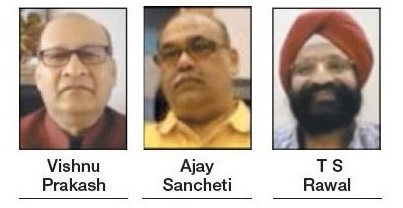India needs reforms to become Asian Tiger: Experts
| Date :23-Oct-2020 |

Business Bureau :
Vidarbha Economic Development Council (VED) organised a webinar on ‘India’s place among Asian Tigers’ recently. Among the eminent panellists were Vishnu Prakash, IFS, former Envoy to Canada and South Korea, Ajay Sancheti, former Rajya Sabha member, leading industrialist and into healthcare and environment protection management and T S Rawal, prominent economist and partner of TS Rawal and Co, Chartered Accountants. Vishnu Prakash said that countries like Singapore, Japan and Korea were all devastated economies but had revived fantastically due to export-led growth.
He observed certain common key factors that led to this revival viz., industrialisation and exports, discipline and diligence, patriotism and a national character and flexibility in labour laws and taxation. “India would be the third largest economy in the world in another 20 years,” said Prakash, “As we have conducive elements such as a democracy, an aspirational population, frugal innovations, youth, size of our market, and we are heading for food and energy security.” He further said, “Inspite of all these positives, India was still in the take-off mode for the past 30 years, and that was because we have failed to expand our manufacturing base and our security environment remains very vulnerable. In order to compete with the world, we have to provide ease of doing business, introduce the next generation of reforms and go for industrialisation.India needs reforms to be Asian Tiger,” he said.
Ajay Sancheti said, “India is the fifth largest economy today after the US, China, Germany and Japan, but we need to speed up and scale up. But in order to compete within Asia, we are lacking in one area, i.e. our need to develop regional sectors all over the country, only then can we have over-all development.” “Our banking system has to compete with the world markets and standards. The banks have to provide timely availability of money. Businesses came from China to the small countries which made it very conducive for them to go there which India did not do, hence we lost out.” T S Rawal argued that there were three critical interventions that Governments could use to speed up economic development.
The first intervention was to maximise output from agriculture, which employs the vast majority of people in poor countries. This makes use of all available labour in a poor economy and pushes up yields and output to the highest levels. The second intervention was to direct investment and entrepreneurs towards manufacturing. This is because the manufacturing makes the most effective use of the limited productive skills of the workforce of a developing economy. Focus on exports was the key to success, he said. Finally, interventions in the financial sector to focus capital on small-scale agriculture and manufacturing development provided third key to accelerated economic transformation, he added. Shivkumar Rao, President, VED, Malhar Deshpande, Joint Secretary and Varun Vijaywargi, Secretary General were present.